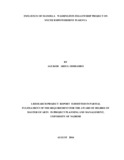| dc.contributor.author | Odhiambo, A. A | |
| dc.date.accessioned | 2016-11-15T08:29:31Z | |
| dc.date.available | 2016-11-15T08:29:31Z | |
| dc.date.issued | 2016-08 | |
| dc.identifier.uri | http://hdl.handle.net/11295/97241 | |
| dc.description.abstract | The Young African Leaders Initiative is the flagship program of President Obama that empowers young people. The Fellowship provides selected outstanding young leaders from Sub-Saharan Africa with the opportunity to hone their skills at selected U.S. Universities with support for professional development back in Africa. Through this initiative, it is expected that the young African leaders will be empowered to gain the skills and networks they need to spur economic growth and contribute more robustly to strengthening democratic institutions and enhancing stability and security in Africa. The study closely looked at Mandela Washington Fellowship project which is a 12 months program that includes youth leadership training, mentorship and internship. This study sought to assess the influence of the project on youth empowerment in Kenya. The study objectives were; to determine the extent to which internship by MWF influences youth empowerment in Kenya; to establish extent to which mentorship by MWF influences youth empowerment in Kenya; to assess the level at which grant provision by MWF influences youth empowerment in Kenya; to examine the extent to which networking by MWF influences youth empowerment in Kenya. The study utilized descriptive survey research design. The target population for the study was Mandela Washington Fellows of the first cycle from Kenya; representatives from the project beneficiaries; staff of organizations who participate in Mandela Washington Fellowship activities. Interviews were administered to all the 15 organizations who participated in MWF activities in cycle 1, while questionnaires were used to collect data from all the 46 Kenyan Fellows. To enhance validity in this study, content related validity of the interview guide on schedule was determined by the help of the research supervisor. The supervisors provided guidance to ensure that the instruments were well constructed, so that the research instruments address the information sought by the research. Questionnaires were used as instruments to collect data from the 46 respondents of which there was 89% response rate. The quantitative data obtained was coded appropriately and analyzed using Statistical Package for Social Scientists (SPSS version 21.0). The results were presented in tables using descriptive statistics (frequency counts and cross tabulations).Analysis of content was used to make sense out of the qualitative data collected. The study concluded that indeed MWF activities influenced youth empowerment in Kenya as 40 respondents (97.6%) reported change in their engagement after the completion of the project. All the 41 respondents also recommended the MWF activities to future Fellows as they reported benefiting through increased networks, increased knowledge and grasping of unique skills due to the opportunities of the MWF project. The study recommended that the project financier should adopt a multi-sectorial approach in addressing youth empowerment gaps by liaising with the Kenyan government | en_US |
| dc.language.iso | en | en_US |
| dc.publisher | University of Nairobi | en_US |
| dc.rights | Attribution-NonCommercial-NoDerivs 3.0 United States | * |
| dc.rights.uri | http://creativecommons.org/licenses/by-nc-nd/3.0/us/ | * |
| dc.subject | PROJECT PLANNING AND MANAGEMENT | en_US |
| dc.title | Influence Of Mandela Washington Fellowship Project On Youth Empowerment In Kenya | en_US |
| dc.type | Thesis | en_US |



